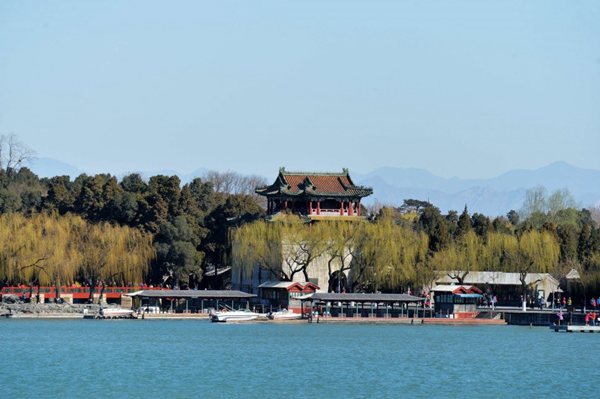

China’s toughest pollution control campaign has not only helped clean the environment, but also facilitated economic restructuring, a senior environmental official told a press conference on Tuesday, adding that the environmental protection measures have proven to be effective.

The Summer Palace under blue skies in early spring of 2017. Data shows that a total of 226 days reported good air quality in Beijing in 2017, 28 days more than in 2016, while the number of severely polluted days reduced to 23 from 39 days in 2016. (Photo from People’s Daily Online)
Liu Bingjiang, head of the air environmental management department at the Ministry of Environmental Protection (MEP), said, “What the law enforcement measures target is the economy at the expense of the environment, not environmentally-friendly businesses,” Liu stressed that after wiping out such “black GDP”, China’s macro-economy, especially industrial economy, can move towards a better and more healthy direction.
The tough battle against pollution, according to the official, has also helped shift the drivers of economic growth, refresh the city outlook, and further activate production factors while ensuring a cleaner environment.
Despite the tougher than ever measures of environmental protection in 2017, the growth of industrial production picked up, putting an end to the six years of declines since 2011, Liu said, adding that production of major industrial products also witnessed a rise.
The industrial capacity utilization in the country rose 3.7 percentage points from 2016 levels, reaching 77 percent in 2017, also ending the consecutive decline over the previous five years.
The capacity utilization for black metal smelting and calendaring, a branch of the steel industry that was believed to be hit most by the anti-pollution campaign, grew 4.1 percentage points compared with the 2016 level.
The MEP last year launched a pollution control campaign targeting about 62,000 irregular enterprises in the Beijing-Tianjin-Hebei region and surrounding cities, whose efforts were estimated to have contributed to about 30 percent of the fall in PM 2.5 density in the region.
“A macro- and long-term perspective must be adopted for the relationship between environment protection and economic growth,” said the official, explaining that law-enforcement efforts would crack down on the “black GDP” caused by irregular enterprises, but support green GDP.
Some irregular and unqualified firms will certainly have their businesses affected or have themselves closed down as China moves towards a clean environment, but it is a necessary step for economic development, he elaborated.
 Fire brigade in Shanghai holds group wedding
Fire brigade in Shanghai holds group wedding Tourists enjoy ice sculptures in Datan Town, north China
Tourists enjoy ice sculptures in Datan Town, north China Sunset scenery of Dayan Pagoda in Xi'an
Sunset scenery of Dayan Pagoda in Xi'an Tourists have fun at scenic spot in Nanlong Town, NW China
Tourists have fun at scenic spot in Nanlong Town, NW China Harbin attracts tourists by making best use of ice in winter
Harbin attracts tourists by making best use of ice in winter In pics: FIS Alpine Ski Women's World Cup Slalom
In pics: FIS Alpine Ski Women's World Cup Slalom Black-necked cranes rest at reservoir in Lhunzhub County, Lhasa
Black-necked cranes rest at reservoir in Lhunzhub County, Lhasa China's FAST telescope will be available to foreign scientists in April
China's FAST telescope will be available to foreign scientists in April "She power" plays indispensable role in poverty alleviation
"She power" plays indispensable role in poverty alleviation Top 10 world news events of People's Daily in 2020
Top 10 world news events of People's Daily in 2020 Top 10 China news events of People's Daily in 2020
Top 10 China news events of People's Daily in 2020 Top 10 media buzzwords of 2020
Top 10 media buzzwords of 2020 Year-ender:10 major tourism stories of 2020
Year-ender:10 major tourism stories of 2020 No interference in Venezuelan issues
No interference in Venezuelan issues
 Biz prepares for trade spat
Biz prepares for trade spat
 Broadcasting Continent
Broadcasting Continent Australia wins Chinese CEOs as US loses
Australia wins Chinese CEOs as US loses